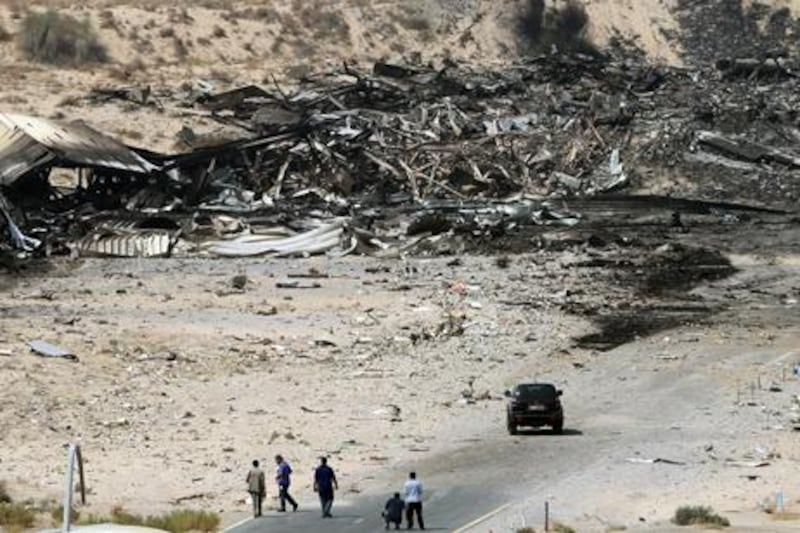DUBAI //The final investigation report on the crash of UPS Flight 6 in Dubai will have ramifications for air safety standards around the world, investigators say.
The General Civil Aviation Authority (GCAA) investigators will release their 350-page report on the September 3, 2010 crash of a Boeing 747-400 on July 1. Two people died in the crash, the captain Doug Lampe, 48, and first officer Matthew Bell, 38.
"The GCAA investigated every single aspect of this accident," said Khalid Al Raisi, the main investigator. Mr Al Raisi and his team worked with representatives from UPS, Boeing, the US Government National Transportation Safety Board and the US Federal Aviation Administration on the 33-month investigation.
"All of the data was analysed, the findings determined and the causes and contributing factors where established," Mr Al Raisi said. "The testing was thorough, involving flight testing and large scale fire tests which had not been performed before."
Investigators analysed the cargo's manifest for undeclared hazardous goods, and combed through the flight details to analyse the different outcomes of the "diversion options" to Doha or Bahrain.
The pilots of the cargo flight were in contact with Bahraini air-traffic controllers when a Main Deck Fire Warning sounded at 7.12pm on the fatal day. They were told they could land in Doha, but the pilots chose to return to Dubai.
Once in Dubai airspace, it became clear they could not change radio frequency meaning they had to communicate with Dubai air traffic control through their counterparts in Bahrain.
By the time they attempted to land at Dubai International Airport, thick smoke had filed the cockpit and the aircraft overflew the runway at about 4,000ft, then turned right. Five minutes later, emergency services were alerted when the plane crashed inside Nad Al Sheba Military Base, close to the junction of Sheikh Mohammed bin Rashid Road and Al Ain motorway.
As part of the investigation, the GCAA travelled to a laboratory in the US where the aircraft systems were tested under extreme heat. Aircraft containers and pallets were burnt at the laboratory to determine the burn characteristics.
Flight simulators at Boeing's training centre in the US were also used and the flight recorder and data was analysed in the UAE.
Mr Al Raisi confirmed that a shipment of lithium batteries onboard were a contributing factor to the fire. "The bulk carriage of these batteries is an inherent risk if they are damaged as they can go into a condition referred to as 'thermal runaway'," said Mr Al Raisi.
Investigators also scrutinised the crew's oxygen delivery system and investigators used computer simulations to determine where the fire started.
The fire protection of the aircraft's critical systems was tested as well as its flight recorder.
When the report is released, it will include the findings of all these tests as well as a list of safety recommendations set forward by the GCAA to prevent similar crashes occurring. Mr Al Rais could not reveal the specifics of the recommendations but said they would improve air safety for all.
"It is the safety recommendations that result from an accident of this scale that are the achievement," he said. "The safety recommendations are far reaching, will improve safety globally and enhance the reputation of the GCAA."
Saif Al Suwaidi, director general of the GCAA, said working as part of the international team had been beneficial and helped bolster the reputation of the GCAA.
"Over the past years, the GCAA has gained enormous capabilities in handling air accident investigations, and we are very keen to collaborate with other specialised entities to share expertise and enhance the safety of the UAE skies," he said.
eharnan@thenational.ae






